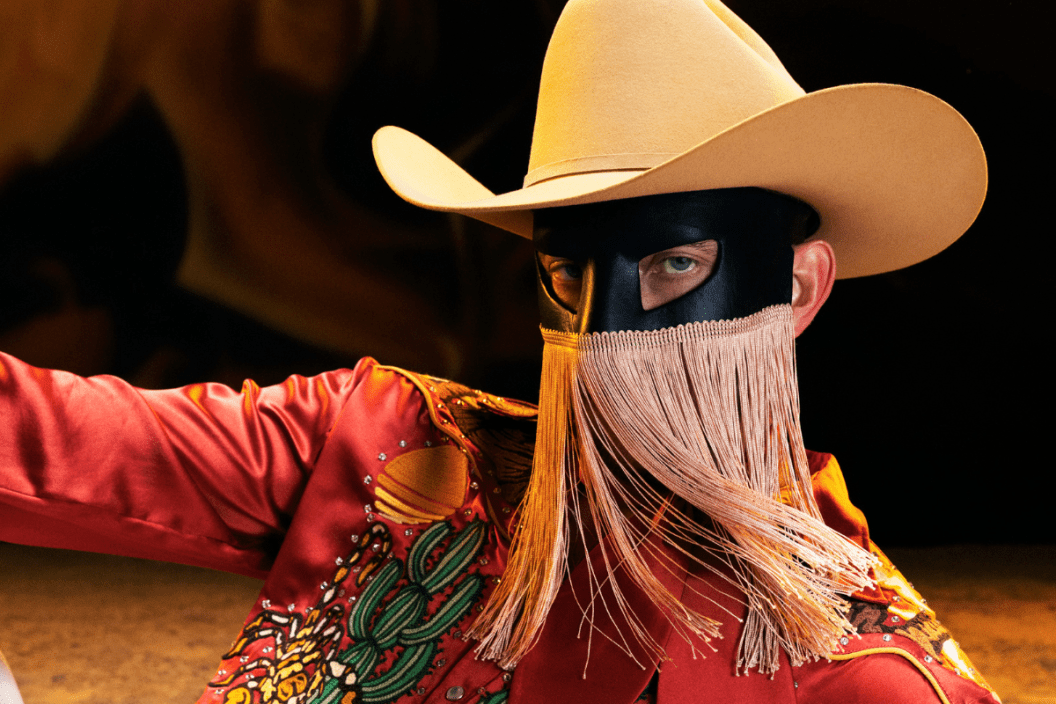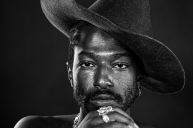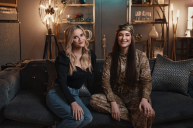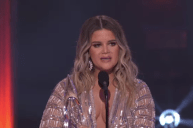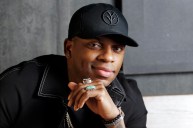"Country music fans come from all walks of life. They're in all shapes and sizes, and they love all kinds of people."
Orville Peck is ready to show the world who he is. As one of three series mentors on Reese Witherspoon and Kacey Musgraves' new Apple TV+ series My Kind Of Country, the mysterious singer is stepping into the spotlight — all while keeping his mask on, of course. For Peck, who is gay and from South Africa, the series' vision was a natural fit, with the Bronco and Pony singer long having pushed to expand the boundaries of what's possible within country music. Wide Open Country talked to Peck about what "country success" means in 2023, his continuing relationships with the show's contestants, and whether he let anyone on set get a glimpse under his fringed facade.
Wide Open Country: Tell us about being approached to do the show. How did you first hear about My Kind Of Country?
Orville Peck: It was brought to me quite a while ago now. I had been offered competition shows in the past and they didn't really appeal to me because of the traditional sort of competition vibe, but this one was pitched differently. They said, "We're going all over the world and the focus is going to be on finding artists who will be treated as artists and not just as disposable contestants. We're looking for people that have a love of country, and that's the only requirement. It doesn't matter where they're from." There was a big emphasis on inclusion and diversity, and so for me, that was a no brainer.
For me — and also for [fellow mentors] Jimmie [Allen] and Mickey [Guyton] — we've already been trying to do that within our own respective careers. We've been trying to bring new perspective and diversity and inclusion into country music, and trying to foster that with other artists that we work with.
WOC: You have a small group that you initially mentor. What were you looking for in a contestant for the show?
OP: What was really important was stories I hadn't heard before. So whether that was about someone from right here in the States that had a different perspective or somebody from my home country of South Africa or somebody from India or wherever it might have been, I was looking for people that could tell genuinely authentic stories in country music.
WOC: These artists can be so wide ranging. How would you define what the "country music sound" is in 2023?
OP: I think it's as mixed and diverse now as it has always has been in country. Country is such a hard thing to define. A lot of people try to define it by a sound, but the truth is that country music evolved out of African influences, Indigenous influences, Mexican influences, European influences... It's such a melting pot of a genre and that's why it's become so eclectic and always evolved over the years. So, does a banjo make a song country? Maybe.
I think that the most pivotal and important aspect to a country song is that it's authentic. That can be shown through sincerity or humor or wit or whatever it might be, but it has to have heart and sincerity and tell a story because country is a storytelling genre.
So that's what I gauge country music off of. It's got to do with influences and instrumentation and whatever, but at the end of the day, if it's a genuine story, I believe that's country.
WOC: As you mentioned, you are from South Africa and there are contestants on the show from South Africa and India and Mexico. How much do you know about what the country scenes are like in those countries and why there is, for instance, a surprisingly robust country scene in India?
OP: I think country music extends beyond location.
The banjo was from Africa and it makes sense to me that there's a country scene there and that people are taken with the sounds of the stories. I think we all share the same story at the end of the day, which I think is what makes country music universal.
I mean, I was always listening to country when I grew up in South Africa. I wouldn't say I was in the majority because it's not huge there like it might be if you grew up in Texas or Nashville or Mississippi or something, but the appeal of the stories and storytelling reaches and extends all over the world.
You're always going to have some kids in the middle of nowhere that you don't expect playing their dad's Johnny Cash vinyl and growing up on country. That's what I did.
WOC: I have a friend who lived in Zambia for years and he said that everyone he knew there listened to Kenny Rogers and Dolly Parton tapes.
OP: One of the Congo Cowboys was saying that in their village in Mozambique, they were listening to Dolly Parton when they were a child. Her music extends further than a lot of people realize.
WOC: This show filmed in Nashville and features a lot of people who are involved in the mainstream country scene but country extends so far beyond just that scene. You can be a country success without winning a CMA Award. How connected do you feel to the mainstream country scene in Nashville and do you think that the contestants on the show need to take over Nashville to be country stars?
OP: No, I don't think so. Just like any genre, it's safe to say that whatever is at the top of the mainstream is not necessarily indicative of the entire genre. It's usually the opposite.
There is no harm in being a chart topping country musician. That has its place and it's very successful in America but I think a lot of that music is driven by money and by a lot of decisions that those artists aren't even involved with or want to make. A lot of them don't write their own music and it's a different thing. It's not what I think of as going in and making a song or putting your heart into music.
A lot of times those musicians show up at a studio and the song was written for them so they just sing the song and go home. It's like going to work at a bank. It's got its place, and it's all good but I don't think we should be under any misconceptions that that's some true form of country music, because it's just the business, really, in my opinion.
WOC: Did you know Mickey and Jimmie beforehand? You three seem to really love each other on the show.
OP: I had never met Jimmie but we became best friends because we have a similar sense of humor. Mickey and I had worked together before at the Miley Cyrus pride special a couple years ago. We hung out there and got along instantly. I feel like I've known Mickey forever.
Also, all three of us really had to kick down a lot of doors to try and get our careers to where they are now so I think you share a camaraderie having come up that same way, which is also why we had so much respect and investment in these artists. None of us got handed a golden ticket in any way. We all had to really, really work to even be where we are in our respective careers now.
I think that's why we have such love for and investment in these artists, because we see a lot of ourselves.
WOC: Speaking of that, are you going to continue to mentor these contestants? Are you still in touch?
OP: Oh, yeah. That's the thing. We made a point of saying at the end of each episode when we send someone home that this isn't the end, because we are here as those people's peers now. They're working musicians just like us and they're out there in the world. They can ask for whatever they need from us.
Jimmie has actually already taken a couple of them out and I'm talking with some about how I can help. We're there for them as much as we would be for anyone that's a fellow musician in the business that we respect.
WOC: There have long been queer country artists, like Lavender Country and yourself, but on the show you expanded that spectrum and brought in non-binary artists and people from all over the LGBTQ+ spectrum. What do you think the future of queerness is in the country scene, especially in light of what's been going on in Tennessee with the drag bans and anti-trans legislation? It seemed telling that Maren Morris was the only "mainstream" country artist to show up at the big LGBT rally concert they had at the Bridgestone recently.
OP: Yeah, I mean, I don't find that surprising. Maren is such an amazing person that it makes total sense that she would be there, but it's also not surprising to me that other big artists wouldn't show up because, sadly, there's still so much stigma and so much holding back from inclusion in this genre. It's sad, because a lot of the big artists that I've met, they're fans of mine more than they let on but they're held back by this Nashville machine that seems to control so much unhappiness in this genre.
It just doesn't make any sense to me. I don't know what their endgame is but I can tell you that country music fans come from all walks of life. They're in all shapes and sizes, and they love all kinds of people. They look all kinds of ways, and they are not given enough credit for what they want to actually see out there. This show and Mickey and Jimmie and I are examples of that. We all got told that we would never have careers and we would never be successful. There's no market for people like us in country.
I think everyone needs to stand up against this stigma about country music because we love it. That's the thing: I will never give up on country music. It's what I love with my whole heart and it's my favorite genre. I refuse to let these people tell me I can't be a part of it, because it's just not true. We have to stop letting old white men in suits make decisions for the rest of us because it's just not how the world is anymore.
WOC: Amen to that. Last question, though: Did you let any of the contestants see under your mask? Did anyone get the full Orville experience?
OP: Not this time around. Maybe that'll be the prize for season two.
READ MORE: 'My Kind of Country': Everything to Know About the New Singing Country Music Singing Competition
